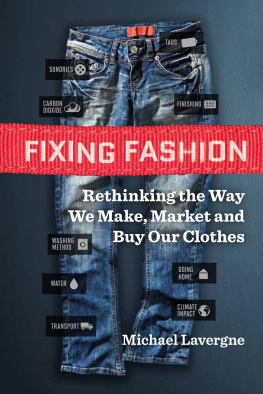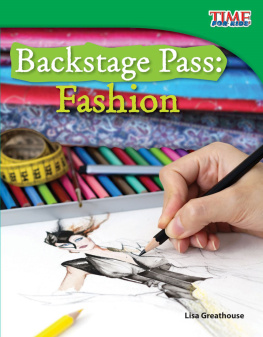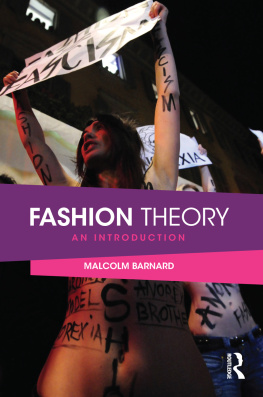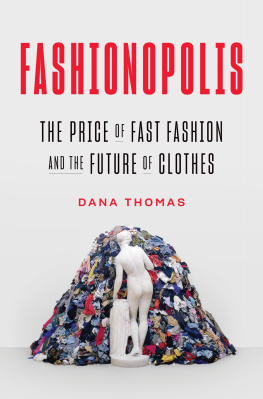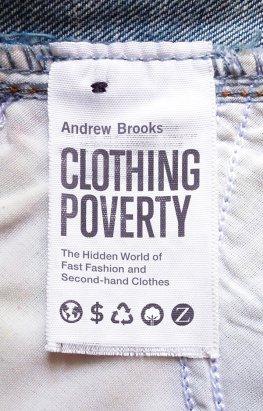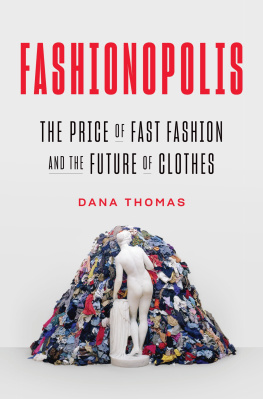Praise for Fixing Fashion
Fixing Fashion offers brilliant insight into all that is broken in the apparel industry. Michael Lavergnes brave and honest telling of what really goes on behind the scenes is an eye-opener that fuels the impetus for change. His thorough political and historical depiction that spans centuries makes for a powerfully evocative narrative that is crucial to solving the many problems facing the fashion industry. In order to fix what is broken, we must first learn how it came to be broken.
Kelly Drennan, Founding Executive Director, Fashion Takes Action
A must-read for for every designer and apparel executive who does not yet have full transparency in their supply chain. Fixing Fashion outlines how exploitation has been entrenched in the apparel industry for over a century. Lavergne then uses this historical context to map opportunities for longterm change, including a long list of change makers who are redefining fashion.
Kate Black, author, Magnifeco: Your Head-to-Toe Guide to Ethical Fashion and Non-toxic Beauty
Fixing Fashion is a fascinating personal and historical journey through the complex web of clothing supply chains. Author Michael Lavergne urges us to reflect on how we are linked, through that web, to people around the world (including millions of children) who are embedded in the clothes that we wear. The book is a compelling call to government, business and all of us towards increased transparency and greater action to ensure more just and sustainable supply chains.
Harry Kits, Senior Advisor Corporate Engagement, World Vision Canada
A rare insiders globetrotting tour of the ethically challenged, complex, contradictory, and maddening global fashion industry. If youve ever wondered how an industry with so much potential to do so much good could permit thousands of vulnerable workers to needlessly die at Rona Plaza in Bangladesh, read Michael Lavergnes highly personal wakeup call.
Dr. David Doorey, Professor of Labour Law and Supply Chain Governance, York University, Toronto
Through his seasoned and humble eyes, Michael Lavergne offers a rare glimpse into the complexities of the apparel industry in his book Fixing Fashion. Taking us through compelling stories from his personal experiences, and layering on news accounts of landmark human rights and environmental events in recent history, Michael invites us to question our assumptions about where our clothing comes from and how we, as consumers, can make better choices going forward. This is a must-read book for anyone who cares about the human and environmental toll of our clothing and the companies behind the labels.
Amy Hall, Director, Social Consciousness, EILEEN FISHER
Who makes our clothes? How are they designed and marketed? After the shocking Rana Plaza factory collapse in 2013, people started asking these pertinent questions. Michael Lavergnes book Fixing Fashion soberly dissects the fast fashion industry and looks at how to fix it. This should be compulsory reading for decision makers, designers and consumers.
Paul Dewar, Member of Parliament Ottawa Centre, Foreign Affairs Critic for the NDP
His unique perspective as an industry insider who has travelled the world sourcing goods for global clothing brands gives us both a first-hand view of the social and environmental problems in apparel manufacturing as well as a deep understanding of why they persist. Lavergnes account will inform and inspire students of business and international development as well as present and future business leaders who will be called upon to tackle the serious and complex problems he uncovers. Thankfully Lavergnes detailed account also points towards paths for change.
Kevin Thomas, LLM | Director of Shareholder Engagement, SHARE - Shareholder Association for Research & Education
In Fixing Fashion, Michael Lavergne offers a rare insider view of how the globalized garment industry works and why worker rights abuses are so endemic to that industry. He also offers hope that fundamental change is possible.
Bob Jeffcott, Policy Analyst, Maquila Solidarity Network
Copyright 2015 by Michael Lavergne.
All rights reserved.
Cover design by Diane McIntosh.
All images iStock Jeans: shenor; Label: zoom-zoom; Background: chaoss
Printed in Canada. First printing September 2015.
New Society Publishers acknowledges the financial support of the Government of Canada through the Canada Book Fund (CBF) for our publishing activities.
Paperback ISBN: 978-0-86571-800-5
eISBN: 978-1-55092-595-1
Inquiries regarding requests to reprint all or part of Fixing Fashion should be addressed to New Society Publishers at the address below. To order directly from the publishers, please call toll-free (North America) 1-800-567-6772, or order online at www.newsociety.com
Any other inquiries can be directed by mail to:
New Society Publishers
P.O. Box 189, Gabriola Island, BC V0R 1X0, Canada
(250) 247-9737
New Society Publishers mission is to publish books that contribute in fundamental ways to building an ecologically sustainable and just society, and to do so with the least possible impact on the environment, in a manner that models this vision. We are committed to doing this not just through education, but through action. The interior pages of our bound books are printed on Forest Stewardship Council-registered acid-free paper that is 100% post-consumer recycled (100% old growth forest-free), processed chlorine-free, and printed with vegetable-based, low-VOC inks, with covers produced using FSC-registered stock. New Society also works to reduce its carbon footprint, and purchases carbon offsets based on an annual audit to ensure a carbon neutral footprint. For further information, or to browse our full list of books and purchase securely, visit our website at: www.newsociety.com
Library and Archives Canada Cataloguing in Publication
Lavergne, Michael, author
Fixing fashion : rethinking the way we make, market and
buy our clothes / Michael Lavergne.
Includes bibliographical references and index.
Issued in print and electronic formats.
ISBN 978-0-86571-800-5 (paperback).--ISBN 978-1-55092-595-1 (ebook)
1. Clothing trade--Social aspects. 2. Clothing trade--Environmental aspects. 3. Fashion--Social aspects. 4. Fashion--Environmental aspects. 5. Shopping--Social aspects. 6. Consumption (Economics)--Social aspects. 7. Social responsibility of business. I. Title.
HD9940.A2L39 2015 | 338.4774692 | C2015-903746-8 C2015-903747-6 |

For Wendy Diaz, a child laborer from Honduras
whose voice helped to stir industry actions against child labor
in the offshore apparel trade and for all like her
who have yet to be freed.
Contents
Foreword
Carry Somers
T HE VALLEYS OF THE PEAK DISTRICT where I live are dotted with buildings that bear witness to the legacy of the textile industry in the Midlands.
At Arkwrights spinning mill in Cromford, built in 1771, two thirds of the 2,000 workers who once toiled there were children. Some textile factory owners employed children as young as five, but Arkwright had a more enlightened approach and did not employ children until they reached the age of six, providing them with clothes, accommodation and a basic education. He was seen as a model employer of his time.
Next page
